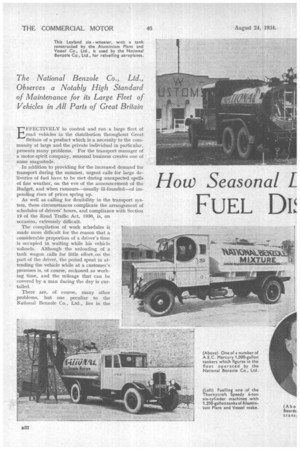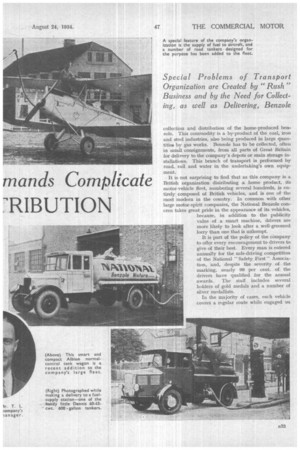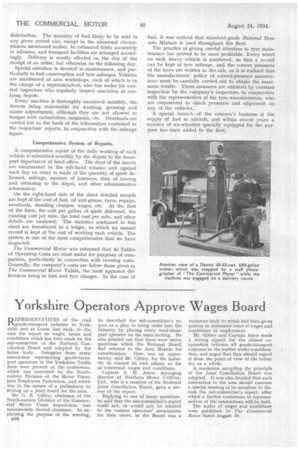How Seasonal L
Page 46

Page 47

Page 48

If you've noticed an error in this article please click here to report it so we can fix it.
FUEL DI!
mands Complicate "RIBUTION
The National Benzole Co., Ltd., Observes a Notably High Standard of Maintenance for its Large Fleet of Vehicles in All Parts of Great Britain
Special Problems of Transport Organization are Created by "Rush" Business and by the Need for Collect. ing, as well as Delivering, Benzoic EFFECTIVELY to control and rim a large fleet of road vehicles in the distribution throughout Great Britain of a product which is a necessity to the community at large and the private individual in particular, presents many problems. For the transport manager of a motor-spirit company, seasonal business creates one of some magnitude.
In addition to providing for the increased demand for transport during the summer, urgent calls for large deliveries of fuel have to be Met during unexpected spells of fine weather, on the eve of the announcement of the Budget, and when rumours—usually ill-founded—of impending rises of prices spring up.
As well as calling for flexibility in the transport system, these circumstances complicate the arrangement of schedules of drivers' hours, and compliance with Section 19 of the Road Traffic Act, 1930, is, on occasion, extremely difficult. ..
The compilation of work schedules is made snore difficult for the reason that a considerable proportion of a driver's time is occupied in waiting while his vehicle unloads. Although the unloading of a tank Wagon calls for little effort on the part of the driver, the period spent in attending the vehicle while at a customer's premises is, ot course, reckoned as working time, and the mileage that can be covered by a man during the day is curtailed.
There are, of course, many other problems, but one peculiar to the National Benzoic Co., Ltd., lies in the collection and distribution of the home-produced benzole. This commodity is a by-product of the coal, iron and steel industries, also being produced in large quantities by gas works. Benzoic has to be collected, often in small consignments, from all parts of Great Britain for delivery to the company's depots or main storage installations. This branch of transport is performed by road, rail and water in the undertaking's own equipment.
It is not surprising to find that as this company is a British organization distributing a home product, its motor-vehicle fleet, numbering several hundreds, is entirely composed of British vehicles, and is one of the most modern in the country. In common with other large motor-spirit companies, the National Benzole concern takes great pride in the appearance of its vehicles, because, in addition to the publicity value of a smart machine, drivers are more likely to look after a well-groomed lorry than one that is iinkempt.
It is part of the policy of the Company to offer every encouragement to drivers to give of their best. Every man is entered annually for the safe-driving competition of the National "Safety First" Association, and, despite the severity of the marking, nearly 90 per cent. of the drivers have qualified for the annual awards. The staff includes several holders of gold medals and a number of silver medallists.
In the majority of cases, each vehicle covers a regular route while 'engaged on distribution. The quantity of fuel likely to be sold in any given period can, except in the abnormal circumstances mentioned earlier, be estimated fairly accurately in advance, and transport facilities are arranged accordingly. Delivery is mostly effected on the day of the receipt of an order, but otherwise on the following day.
Special attention is devoted to maintenance, and particularly to fuel consumption and tyre mileages. Vehicles are maintained at area workshops, each of which is in the charge of a superintendent, who has under his control inspectors who regularly inspect machines at outlying depots.
Every machine is thoroughly examined monthly, the drivers being responsible for washing, greasing and minor adjustments, although they are not allowed to tamper with carburetters, magnetos, etc. Overhauls are carried out on the basis of the information contained in the inspectors' reports, in conjunction with the mileage figure.
Comprehensive System of Reports.
A comprehensive report of the daily working of each vehicle is submitted monthly by the depots to the transport department at head office. The days of the month are enumerated in the left-hand column and against each day an entry is made of the quantity of spirit delivered, mileage, number of journeys, time of leaving and returning to the depot, and other administrative information.
On the right-hand side of the sheet detailed records are kept of the cost of fuel, oil and grease, tyres, repairs, overhauls, standing charges, wages, etc. At the foot of the form, the cost per gallon of spirit delivered, the running cost per mile, the total cost per mile, and other details are analysed. The statistics contained in this sheet are transferred to a ledger, in which an annual record is kept of the cost of working each vehicle. The system is one of the most comprehensive that we have inspected.
The Commercial Motor was informed that its Tables of Operating Costs are most useful for purposes of comparison, particularly in connection with running costs. Generally, the company's costs are below those given in The Commercial Motor Tables, the most apparent differences being in fuel and tyre charges. In the case of fuel, it was noticed that standard-grade National Benzole Mixture is used throughout the fleet.
The practice of giving careful attention to tyre maintenance has proved to be most profitable. Every wheel on each heavy vehicle is numbered, so that a record can be kept of tyre mileage, and the correct pressures of the tyres are written in the cab, as it is realized that the manufacturers" policy of correct-pressure maintenance must be carefully carried out to obtain the maximum results. These measures are enforced by constant inspection by the company's inspectors, in conjunction with the representatives of the tyre manufacturers, who are empowered to check pressures and alignment on any of the vehicles.
A special branch of the concern's business is the supply of fuel to aircraft, and within recent years a number of six-wheelers specially equipped for the purpose has been added to the fleet.




























































































